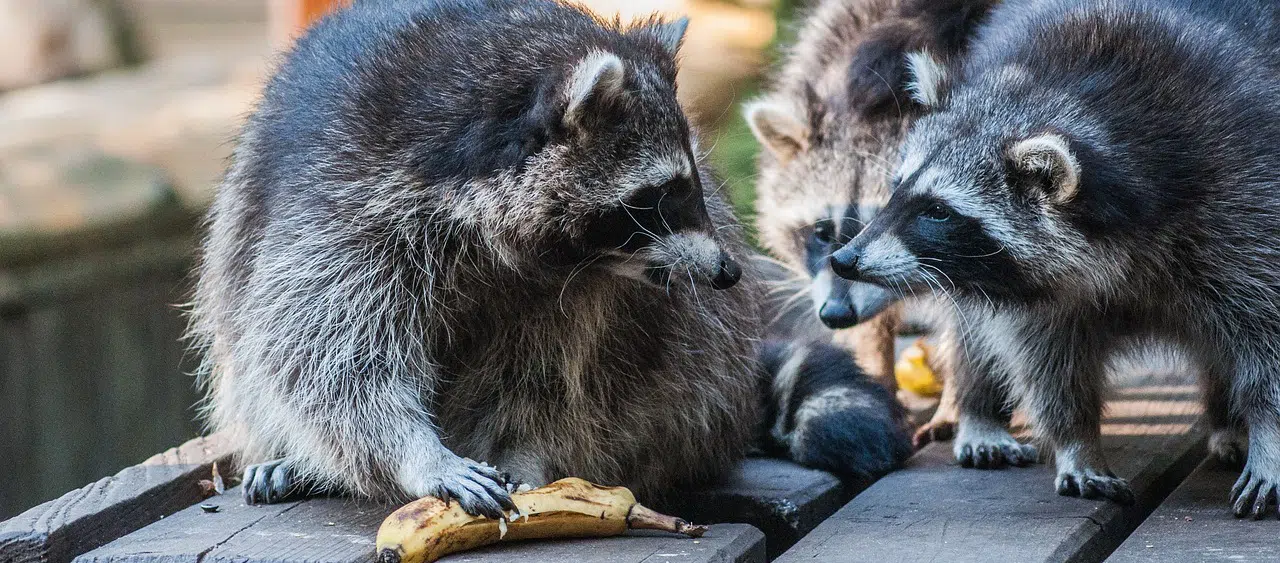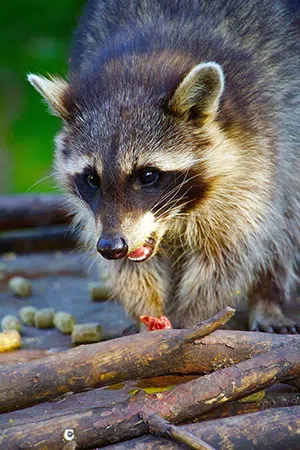Hopefully, your curiosity stems from wanting to prevent raccoons feeding on your trash bin and not because you want to feed them. Because that would create problems for both, the raccoons and you (and your neighbours). It's also illegal.

The Trash Panda
How did the Raccoon earn this somewhat unflattering nickname? Opportunistic and omnivorous, the raccoon has a varied diet that includes - well, just about anything. Omnivorous means, that they consume (and need) nutrition derived from both meat and vegetation. Being able to switch it up according to food availability due to season, location, or food competitors, contributes a great deal to the modern raccoon's impressive adaptability.
Raccoon Diet Requirements
The bones of a healthy raccoon diet doesn't look all that different from human dietary requirements. One might say, the difference lays in sourcing the ingredients :)
- Protein: Found in animal-based foods like insects, fish, and small mammals.
- Carbohydrates: Derived from fruits, grains, and vegetables.
- Fats: Obtained from seeds, nuts, and fatty fish.
- Vitamins and Minerals: From a mix of plant-based and animal-based foods.
Raccoons require both macronutrients and micronutrients to sustain their energy levels, support growth, and maintain a healthy immune system. A lack of nutritional balance leads to malnutrition or other health issues.
What do Raccoons like to Eat in the Wild?
 When in their natural habitat (wooded areas near water), raccoons munch on fruits, berries, nuts, corn, fish, crayfish, frogs, turtles, insects, birds and/or their eggs, rodents, rabbits, and carrion (dead animals). The beauty of such a varied diet is that any one or two of these things are available in any given season.
When in their natural habitat (wooded areas near water), raccoons munch on fruits, berries, nuts, corn, fish, crayfish, frogs, turtles, insects, birds and/or their eggs, rodents, rabbits, and carrion (dead animals). The beauty of such a varied diet is that any one or two of these things are available in any given season.
How do Raccoons Find Food in the Wild?
Raccoons are very skilled foragers and scavengers, rather than hunters. Being nocturnal, they'll roam during the night and kill or pick and eat whatever crosses their path and is manageable. They will travel up to a mile or so on their home range or territory and being the opportunists they are, they rarely leave the ground to procure food. In addition to highly evolved senses, raccoons also make use of their very sharp claws and teeth.
What do Raccoons Eat in Urban Environments?
In addition to aquatic life, birds, eggs, fruits, berries, rodents, and smaller mammals, they're quite fond of human leftovers. Hence the trash raiding. Being such skilled foragers and highly intelligent creatures, they use a combination of sensory abilities and learned behaviors to locate food. Learned behaviors? Yes, they watch and learn.
What Senses do Raccoons use to find Food?
- Touch: Raccoons have highly sensitive front paws that help them identify food items, even in the dark.
- Smell: A keen sense of smell allows them to detect food from an impressive distance.
- Sight: While they don't have the most awesome vision in the animal kingdom, it is enough to see well in low-light conditions.
In addition to relying on their senses, raccoons are keen observers and quick learners. This intelligence explains their success at opening containers, navigating urban environments, and even solving puzzles to score a meal.
Seasonal Changes in Diet
A raccoon's diet very much depends on what's available at different times of the year or in their current location.
- Spring: Insects, worms, and small vertebrates as they emerge from hibernation or dormancy.
- Summer: Fruits, berries, and vegetables that are in abundance.
- Fall: Nuts, seeds, and other high-fat foods to prepare for winter.
- Winter: Scavenged food and stored fat reserves when natural food sources are scarce.
By adapting their diet to seasonal availability, raccoons ensure that their nutritional needs are met year-round, even in challenging conditions.
What Foods do Raccoons like most?
While raccoons don't fall into the picky eater category, they do seem to favour certain foods when given a choice. The answer to what do raccoons like to eat most includes foods that are high in sugar, such as fruits and sweetened items (doughnuts!), are often favored. Protein-rich foods like fish and eggs also rank high on the list. As a side note: If you are trying to trap a raccoon, serve up a peanut butter and jelly sandwich - works wonders!
DO NOT Feed Raccoons
Now that you know what raccoons like to eat, you may be tempted to leave out a treat or two, especially in freezing temperatures and while buried under a mountain of snow. Understandable but not advisable. Also illegal. Feeding wildlife is a terrible idea - both for the animal and for you and your home.
Frequently Asked Questions:
Why shouldn't I feed Raccoons?
- Processed foods are bad for us and no better for wildlife. Nutritional content is minimal at best, and once filled up on junk, raccoons and other animals will stop foraging for 'real' food.
- By encouraging raccoons to hang around your home, you may be inadvertently issuing an invitation to move into your attic.
- By attracting raccoons to your yard, you are also inviting larger animals preying on raccoons.
- You are putting the health of your family and pets at risk. Raccoons are the primary carrier or rabies.
- Seeing that feeding wildlife is illegal, you will incur fines.
What can I do about Raccoons getting into my Trash?
The absolute safest option is to move your trash bins indoors - perhaps into a shed that can be locked and offers no access to raccoons or other wildlife. Otherwise, get creative! :) Use bungee cords or clips to secure your garbage can lid. Move your trash out to the curb on the morning of pick-up, rather than the night before.
Why do Raccoons hang around my yard?
Let's see... do you feed your pets outside? Do you have bird feeders and bird baths? Until your raccoons have decided to move on, all sources of food and water should be eliminated. Do you have fruit trees? Pick up any fallen fruit off the ground. Do you have a lovely vegetable garden and maybe some berry bushes? Unfortunately, only a sturdy, high fence will deter raccoons from helping themselves.
Hawkeye to the Rescue
If you've eliminated any and all reasons for raccoons pitching a tent in your yard and you just want them to leave, contact Hawkeye Bird & Animal Control. We are able to offer you solutions most other wildlife control companies cannot. In addition to trapping and releasing within a kilometer radius, we are able to offer permanent removal. Guaranteed.














